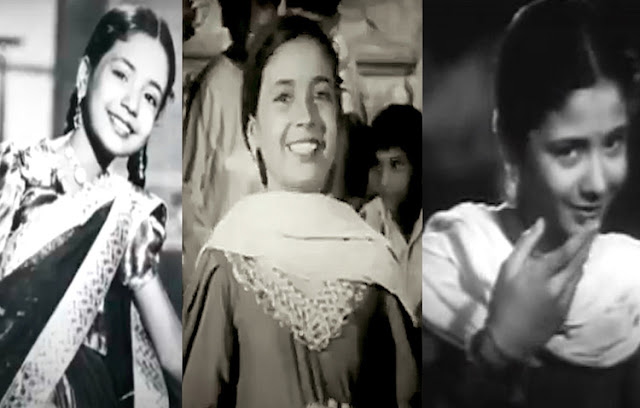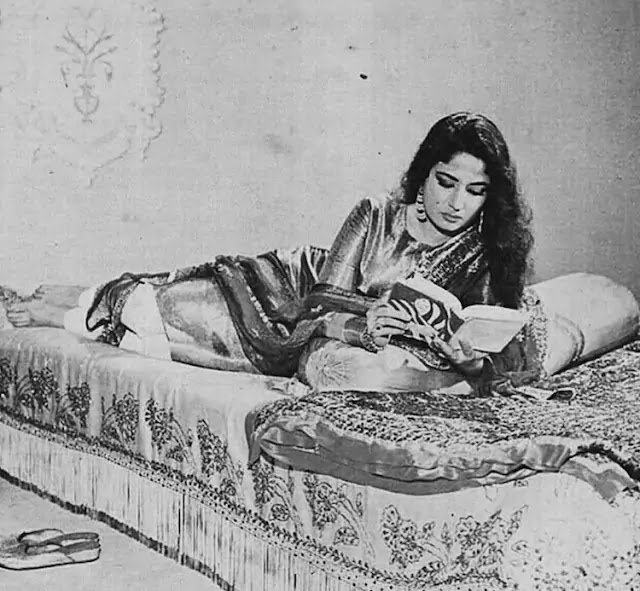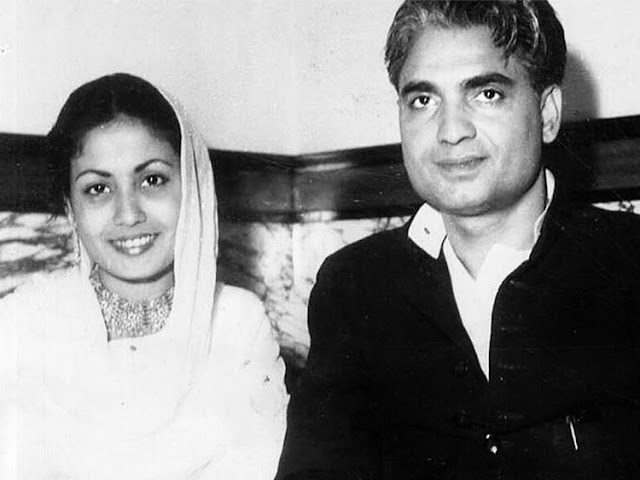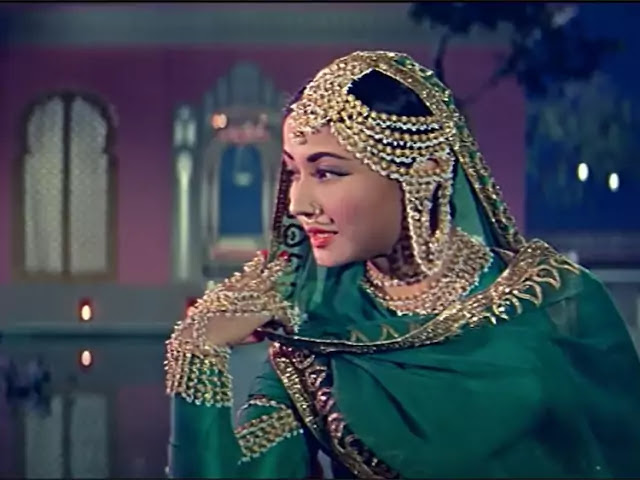Meena Kumari : A free spirit who got deception in the name of love, was no less than a mystery. In her biographer, Vinod Mehta’s words: “She had several dimensions, she read poetry, had literary friends, aspired to the upper life associated and was an alcoholic”.
From her father who made a money making machine out of her, to the elderly husband with whom she had generation gap, to Dharmendra who didn't take her seriously, to Gulzar whom she gave the diary of her poems, Meena brought prosperity to all the men in her life.
Read also: Why Kishor Kumar left Madhubala..?
Birth of the Tragedy queen
Meena Kumari had 2 sisters and her father wanted a son this time but Meena was born. Her father didn’t had enough money which made him leave new born Meena at the door of an orphanage. However, subsequent to being isolated from the child, Meena's mother couldn't stop crying and was in a terrible condition. After which Meena's father came back to bring the infant and to his stun, discovered ants slithering creepily everywhere on over her body.
Examining that eerie childhood occurrence, Vinod Mehta who wrote “Meena Kumari: The Classic Biography” observed, ‘I believe that moment remained in her subconscious mind. Here was a traumatised soul. She was unable to have been a happy individual. Life had concluded that she will endure. She was blessed that this despondency was acknowledged in her roles. She comprehended this feeling so well.'
Born on 1 August 1933 in Bombay as Mahjabeen Bano, Meena Kumari experienced childhood in a family of poor theatre artists. Her father Ali Bux had moved from Bhera (Now in Sargodha District of Punjab Province in Pakistan). Her mother Iqbal Beghum was a Bengali Christian who changed over to Islam.
Meena Kumari's grandmother, Hem Sundari Thakur (Tagore) was the little girl of the Rabindranath Tagore's younger brother. Mahjabeen's father was a struggler in Bollywood yet never got a significant break, however he acted in Parsi theater, played harmonium, taught music and also wrote Urdu poetry . He additionally assumed small roles in a few movies.
Meena (Mahjabeen) never wished to become an actress. On her father's gluttony, she started her career as a child artist at the age of 7. Mehjabeen Naaz made her first silver screen appearance as a child actor in Vijay Bhatt's Farzand-e-Watan. She had to become the breadwinner of the family. She grew up in Dadar-east locality of Bombay (British India).
Baby Mehjabeen worked for Vijay Bhatt Productions' Leatherface-1939, Pooja-1940, Bahen-1941, Nai Roshni-1941, Kasauti-1941 and Garib-1942. Mahjabeen Bano was named as Baby Meena on the sets of Ek Hi Bhool in 1940. Given her promising beginning, she had no proper education except for later from Meena's earned cash her father kept a master to teach her reading and writing. Soon Meena was fluent in Hindi, Urdu, English and became a voracious reader.
Read also: Guru Dutt had endeavoured self destruction twice previously and died in the third suicide attempt
Mahjabeen Bano becomes Meena Kumari
Meena Kumari became heroine at the young age of 14 in Ramnik Production’s Bachchon Ka Khel (1946) with Duniya Ek Sarai (1946), Piya Ghar Aaja (1947) and Bichchade Balam (1948) performing with credit and winning recognition from all in the industry.
Meena Kumari appeared in several box office hits including some mythological and fantasy movies like Veer Ghatotkach, (1949) Shri Ganesh Mahima (1950), Magroor, (1950) Hamara Ghar, (1950) Anmol Ratan, (1950) Sanam, (1951) Madhosh, (1951) Lakshmi Narayan,(1951) Hanuman Patal Vijay, (1951) Tamasha (1952) and Aladdin Aur Jadui Chirag (1952).
Meena nearly gave up her life to acting, truly. While shooting for the last scene of her blockbuster film Bajju Bawra, Meena Kumari nearly drowned. In spite of the fact that she was protected at the opportune time, the shooting was required to be postponed. Her passionate enthusiasm for her character which had nearly ended her life, indeed won her the debut Best Actress Filmfare Award in 1954 after which she rose to fame.
Marriage to Kamal Amrohi
Meena had once met Kamaal Amrohi when she was a child artist and later saw his interview in a magazine after the success of film Mahal, she recollected him. Debutant Kamal Amrohi had earned name as writer-director after the accomplishment of India's first reincarnation thriller Hindi film Mahal.
Already married and a father of 3 children, Kamal Amrohi met Meena a 2nd time when she gave a screen test for his 2nd film Anarkali, but that film was never completed. While Actor Ashok Kumar and Meena Kumari were shooting on the sets of Tamasha, filmmaker Kamal Amrohi officially met Meena in a proper introduction. Post the meeting, Kamal Amrohi enamoured with his muse.
Thereafter Meena Kumari met with a horrendous car accident in 1951 while returning to Bombay from Mahabaleshwar, she was admitted in Sassoon hospital in Pune for 4 months. Kamal Amrohi visited her religiously during her hospitalisation and when they did not meet, they kept exchanging letters. Their friendship bloomed into affection. Subsequent to finishing her treatment, Meena Kumari and Kamal Amrohi chose to get hitched.
Being the prime income earner of the family, Meena shouldn't be hitched without suitable budgetary figuring. This is the reason her father opposed the wedding. Rather than yielding to his pressure, the two furtively got hitched in a simple Nikah ceremony.
Meena Kumari was only 18 while Kamal Amrohi was 34 years of age when the two got hitched. The marriage was kept a secret. After a couple of months, their marriage news broke and Meena Kumari's father demanded her to file for a divorce with Kamaal. Meena Kumari didn't recoil and kept staying at her father's home.
When Kamal Amrohi planned the movie 'Daera' in 1953, he wanted to project Meena Kumari in it, however Meena Kumari's dad didn't permit her to work with Kamal Amrohi. He rather asked Meena to work with Mehboob Khan in the film Amar. Meena Kumari hesitantly concurred, yet following 5 days of shooting with Mehboob Khan, she left the film subsequent to actuating a conflict with Mehboob Khan.
The following day she disclosed to her dad that she had chosen to work with Kamal Amrohi in Daera and that she was set for Bombay Talkies to shoot for Daera. Her dad cautioned that on the off chance that she went toward that path the door of his home would be for all time shut for her.
Meena Kumari was resolute and she went to Bombay Talkies to shoot for her better half's film named Daera. Post shooting when she came back to her dad's home, her father didn't open the door. Meena Kumari turned her vehicle and left for Kamal Amrohi's home in Sion, Bombay. The couple began their unannounced wedded life in 1953. This relationship went on for longer than 10 years.
After the success of Parineeta, Bimal Roy was keen to cast Kumari in his next venture titled Devdas in the role of Paaro. Be that as it may, things with Kamal Amrohi never materialised and the audience lost the golden opportunity to see Kumari essaying the iconic role of Paaro in the film. Such was the ownership of Kamaal in Meena’s life as he was managing her work.
In her free time Meena redirected her consideration towards her affection for reading books. She started composing poetry and her written words were enormous. Later Kaifi Azmi went about as a tutor to her. This adoration for writing poetry united Gulzar and Meena while she was as yet hitched to her only spouse Kamal Amrohi.
Fame and Filmfare
In the year 1963, Meena Kumari made history by being the sole Bollywood actress to have been nominated at all slots for the Filmfare Best Actress award. The nominations were for her roles in Sahib Biwi Aur Ghulam, Aarti and Main Chup Rahungi. She won her third Filmfare Award for Sahib Biwi Aur Ghulam as Best Actress.
Meena never used glycerin to shed tears, but always shed her genuine ones while acting. At the peak of her career, Meena Kumari was the first to purchase an Impala car as she was the highest-paid actress of her generation. In her time Meena Kumari, performed the incredible roles and finding her a competition no top actors were willing to work with her.
Vinod Mehta shares: "Meena Kumari turned out to be incredible to such an extent that she would make or break stars. Kumari adopted an attitude of guardian, artistic mentor towards the newcomers like Rajendra Kumar in Chirag Kahan Roshni Kahan and with Sunil Dutt in Ek Hi Raasta, who worked opposite her. Meena Kumari helped Dharmendra enormously in the initial phases of his career, and established Dharmendra's acting profession in Indian Cinema.
The legendary Kathak master Pandit Lachhu Maharaj praised Meena Kumari's dancing abilities and commented on the interesting manner by which she would take a turn. He stated, "the manner by which she would turn, the edges of her shoulders, easily fallen into place for her and can't be educated." Ashok Kumar said: "Meena was a characteristic entertainer. She was picky, yet once she has accepted a character, she would place her essence into it and it's not astonishing that she's despite everything associated with her delicate depictions.
Some of the time when saying a dialogue I would include a line not in the content and even as I stressed over how Meena would respond, she would surprise me with the perfect reaction of improvisation.
Separation from Husband Kamal Amrohi
Kamal was stringent to the point that he would ask Meena to return home anyhow by 6:30 at night, no one was permitted in her make-up room, she needed to travel just in the vehicle that Kamal had given her with his driver. Indeed, purportedly there was aggressive behaviour at home included as well in Meena and Kamal's married life.
Reviewing the news reports and his rapport with Kamal, Vinod Mehta wrote in the memoir of Meena Kumari: "At the point when her star begin rising, his went down. I inquired as to whether in fact he had hit her according to numerous bits of gossip. He totally denied it, saying that something like domestic violence was totally against his upbringing. However, six distinct individuals revealed to me that there was physical viciousness in their relationship. Those were the days when Meena Kumari would return sloshed till late around evening time".
Abrar Alvi, director of Sahib Bibi Aur Ghulam, recounts how Kamal Amrohi would have his spy and right-hand man Baqar Ali present outside the makeup room while Meena's makeup was being done, and one evening, when working past timetable to finish a shot, he had to face his heroine dissolving in tears.
In 1963, Sahib Bibi Aur Ghulam was chosen as the Indian entry to the Berlin Film Festival and Meena Kumari was chosen as a representative. The then Minister of Information and Broadcasting, Satya Narayan Sinha, arranged two tickets, one for Meena Kumari and one for her husband, but Kamal Amrohi refused to accompany his wife out to selfhood. The Berlin trip could not happen.
Again during a premiere at Eros cinema, Sohrab Modi introduced Meena Kumari and Kamal Amrohi to the then governor of Maharashtra. Sohrab Modi said "This is the famous actress Meena Kumari, and this is her husband Kamal Amrohi". Whereupon before greetings were exchanged, Kamal Amrohi interposed: "No, I am Kamal Amrohi and this is my wife, the prestigious actress Meena Kumari". Saying this, Kamal Amrohi left the auditorium and Meena Kumari saw the premiere alone.
On the other hand most of Kamal Amrohi’s lavish productions like Daira and Pakeezah, including his Kamalistan Studios were financed by Meena Kumari. Meena wanted to become a mother but her workaholic life of which Kamaal was the owner never permitted her enough time. Meena discovered her child in Kamal Amrohi's son from the first marriage, Tajdaar, who was significantly attached to her.
On the mahurat of the film Pinjre ke Panchi, on 5 march 1964, Kamal Amrohi's aide, Baqar Ali had a squabble with entertainer Meena Kumari when she demanded letting the maturing lyricist 'Gulzar' into her make up room. It was accounted for that Baqar even slapped Meena Kumari before everybody. Baqar used to keep an eye on Meena Kumari on Kamal Amrohi's solicitation.
After that episode, Meena Kumari told Baqar to tell her husband that she would not be coming back to his home ever and she kept her words. The exact night, she moved to in entertainer Mehmood's home for some time. Mehmood was married to her sister, Mahalekha (Madhu). She later moved to Janaki Kutir residence in Juhu, Bombay. It is said that Kamal Amrohi had rushed to Mehmood's home to accommodate their disparities and to escort her back, however Meena Kumari refused. Persistent Meena stayed away forever from Kamal Amrohi's home thereafter.
According to Meena Kumari’s biography, an incident took place with Kamal Amrohi and Meena Kumari during the film Pakeezah. On his way to Delhi, the petrol in his car ended up in Shivpuri. Amrohi said that we will spend the night in the car on the road. However, it was a region of bandits. After midnight, about a dozen bandits surrounded their cars. One of them told the people sitting in cars to get down.
After a while the main dacoit came to them. Meena Kumari was also sitting in the second car, seeing her, the dacoit's gestures changed. He informed them to relax and immediately arrangements for their night halt, food, music and dancing were done. The next morning petrol for Kumari's car was arranged.
And when the whole team was going back, the head dacoit asked Meena Kumari to give her autograph on his hand by carving her name with his pointed knife. Meena Kumari gave autograph to her crazy fan. After going to the next city, they came to know that the crazy fan was dacoit Amrit Lal.
Another journalist Ali Peter John, based out in Bombay , had described: Meena Kumari was escorted everywhere she went by Baqar, Amrohi’s friend who kept a close tab on her. This made Meena feel suffocated in her marriage, who was now living her childhood because she had never enjoyed her childhood freely.
Read also: 66th National Film Awards winners
Lifestyle and Personal Life
Mehta’s book also tells us about the signature white dress that Meena Kumari used to adorn in all her public appearances. Mehta also states that Meena disdained flamboyancy and parties and “the synthetic bonhomie of the film world. Most people considered her a snob, only intimates knew she was genuinely bored by such occasions”. Yet she appeared at Filmfare award functions in her trademark white saris and used to recite her own or Faiz’s ghazals on such events.
The two prominent ones were with Dharmendra who was belittled by Meena and owed his fame to her assistance. She acted with him and as Mehta lets us know, instructed him in the craft of film. At this point Meena had acted in about 90 movies. Nonetheless, an a lot more youthful but married Dharmendra had nothing to offer to Meena, who was craving for love and security.
The other tricky relationship was with Gulzar who by chance stayed faithful and near her and was even present in the clinic when her condition disintegrated. Mehta himself couldn't learn the idea of this relationship as Gulzar ji stayed hesitant during different communications with Mehta. One pointer is telling: Meena left all her diaries with Gulzar and most of their contents remain unpublished to date. It is extremely important that Gulzar Saheb make them public. After all, Meena belongs to her fans and the bigger cultural canvas of the subcontinent.
There was also a rumour that Amrohi had divorced liberal minded Meena Kumari but later Kamal realised his mistake. He needed to again acquire Meena. Be that as it may, as per Islamic religion this was conceivable simply after Halala. Kamal got her wedded with her companion and Zeenat Aman's dad Amanullah Khan and following a month he was hitched again to Meena Kumari.
Meena Kumari was a chosen face to be featured on several film magazines and beauty soaps throughout her career. Her step-son recalls that Meena Kumari was an avid reader of novels by Agatha Christie and consistently used to keep mogra flowers by her bed before she dozed. The producers of film Jahan Ara (1964) had approached Kumari to do the role of Jahan Ara Begum.
Having a motherly heart, Meena Kumari consistently adored Kamaal Amrohi's children from the past marriage. She was being called Choti Ammi by Kamaal's children. Meena used to state, who says I don't have a kid they are meena kumari children. Kamaal Amrohi’s previous wife respected Meena and so did Kumari.
Meena kumari last movie Pakeezah
Usually due to patriarchal upbringing those days men had male chauvinist attitude towards their wives and Bollywood husbands were no different. Most of the women in those days have been subjected to discrimination by the male dominated film industry. But, all said and done, Meena’s Kamal Amrohi's PR man had said: "Shah Jahan made Taj Mahal for his wife, Kamal Sahab needed to do the equivalent with Pakeezah." The idea, Kamal Amrohi says was irretrievably fixed with his adoration for his significant other Meena Kumari. As indicated by Kamal Amrohi, he planned to make a film which would be deserving of her as an actress, and deserving of the adoration he felt for her as a lady.
Read also: How did Bollywood get its name
In 1968, Kumari was analysed with cirrhosis of liver. Meena Kumari's wellbeing was delicate to the point that specialists had revealed to her that her next drink would execute her. Despite the fact that she left drinking for some time and recouped briefly, her wellbeing was as yet a worry.
And then came Kamal in her life again but less for personal gratification but more for professional gains. Pakeezah was Kamal's fantasy venture which had gotten deferred as a result of the couple's separation. Kamaal composed a letter to Meena:
“Only Pakeezah completion remain unsettled. You have made a condition that unless I give you a divorce you will not complete Pakeezah. Even this knot can be untied … I will free you from your marital ties. If you wish to complete your Pakeezah. I would be the most happy. This is my request, that Pakeezah on which the fortune of many people depends, and which had the good wishes of many people should not be left uncompleted. You have better means. You have box-office appeal, and above all Pakeezah needs you personally … Pakeezah that is like a sinking ship will reach a shore under your care”.
To this, Meena responded:
“In regard to my working in Pakeezah, I have always been willing and clamouring to work. Pakeezah is my life dream too and it will be my greatest pleasure to see it completed. As for my remuneration, I am glad you have given me an opportunity to prove my regards and respect for you. I shall accept only ONE GUINEA as a token of goodwill for my entire work in Pakeezah”.
The medical advice was that Meena needed more advanced and permanent cure. She received treatments in London and Switzerland for liver cirrhosis. Upon recovery, Kumari came back to India in September 1968 and on the fifth day after her come back, Meena Kumari, as opposed to specialists' guidelines was prepared to continue work. As Meena at last had chosen to finish Pakeezah at the behest of Kamaal's companions Sunil Dutt and Nargis.
Hence the film became a bridge to even bring Meena and Kamaal closer. Meena was conscious that she would not look as wonderful as she did in her initial days, yet Kamaal guaranteed her that he will make her look as lovely as she appeared in the prior movies.
Furthermore, Amrohi was to offer the role of the forest officer in his film Pakeezah to Mr Dharmendra and Dharam Ji had nearly got it. Amrohi was extraordinarily intrigued by this youngster, and genuinely Dharam had all the characteristics vital for one who lives and cares for a forest. Notwithstanding, when Dharam's relationship with Meena’s growing friendship was known by media, somebody cautioned him that on the off chance that he got excessively amicable with Meena his odds of handling the desired role would be risked.
Dharmendra paid no regard, thus it happened. In spite of the fact that Kamal considered Dharmendra altogether qualified for the job, he pulled back the offer. He was unable to work with a man who was freely having an unsanctioned romancing desire for his wife, an Amrohi aide told.
Because of her dedication to her art and spouse, Meena completed the film in spite of her ill-health and bitterness with Amrohi. Pakeezah was successfully completed, however the grand film didn't get a good opening. Released on 4 February 1972, Pakeezah was written & directed by Kamal Amrohi. The music of Pakeezah was formed by Ghulam Mohammed and Naushad Ali. Meena Kumari played Tawaif (Courtesan) Sahibjaan.
Meena Kumari death
Three weeks after the release of Pakeezah, Meena Kumari became seriously ill, on 28 March 1972 she was admitted to St Elizabeth's Nursing Home. Prior to her demise, she was in an awful monetary situation. It is said that she didn't had any desire to concede in a nursing home, as she had no cash to take care of her clinic bills. At that point spouse Kamaal Amrohi came to help his dying wife.
At the hospital when asked by the doctors for meena kumari husband name, Meena’s sisters indicated towards Kamaal. He was available in the hospital while Meena took her final gasp. In fact her relatives, well wishers and fans were likewise present outside to give homage to the unmatched heroine. Following two days of being in the unconsciousness, she inhaled her last breath on March 31, 1972, at the youthful age of 39. Meena Kumari funreral took place at Rahematabad Qabristan situated at Narialwadi, Mazgaon, Mumbai.
Pakeezah had not got instant positive response and initial reviews were disheartening. Yet, her passing changed fortunes as Pakeezah turned into a stage for her fans to honour their favourite heroine. Yet, Kamaal Amrohi never gave any credit to his wife Meena Kumari for any of his success.
Pakeezah was a story of an esoteric love-chasing lady. Pakeezah turned out to be profoundly acclaimed. Afterwards Pakeezah made news during the Filmfare Awards in 1972 when Bollywood actor Pran did not acknowledge his award for Be-Imaan on the grounds that he felt that Ghulam Mohammed merited an after death Filmfare grant for his songs in Pakeezah.
Legacy of the free spirit
Meena was an exquisite poet who wrote under the pseudonym Naaz, with this she decided to hold on to a fragment of her birth name. The 'Tragedy Queen' found a way to put her grieving heart into words with poetry. The intensity of Naaz's words were as powerful as Meena's acting. Meena kumari I write I recite’ is a collection of Meena’s self written poems sung by her, which is available for fans on you tube and amazon music. Before her last days, Meena gave her own poems and diary to Gulzar as a gift, that were later published by him.
Meena had a golden heart, she helped lot of people including her relatives in their financial crises. She use to never forget if ever anyone was good to her or did any favour for her. Mumtaz once worked in a film for Meena Kumari. Nonetheless, because of some budgetary emergency, Meena couldn't give Mumtaz her fee. She needed to pay around three lakh rupees to Mumtaz. Despite the fact that Mumtaz additionally never requested it, however Meena had always remembered that. One day when Meena was sick, she called Mumtaz and gave Mumtaz her house on Carter Road in exchange for the due fee.
Everybody, who came in contact with this god gifted talent, be it her father, her better half, her family members and additionally others, exploited her guiltlessness and her being innocent. According to a family member Meena Kumari and Kamaal Amrohi just couldn’t live together due to ego clashes. Also People jealous of Amrohi poisoned Meena against Kamaal and the two grew apart.
A suffering tragic heroine Meena Kumari died of loneliness and excessive drinking, but ruled the world of Indian cinema until her death. A very tragic life story of such a successful actress, and graceful personality. Meena Kumari hit movies has always been a subject of interest among present day filmmakers, thanks to her massive star appeal. The golden era of Bollywood having evergreen songs is remembered through featured Meena Kumari songs as well.





























1 Comments